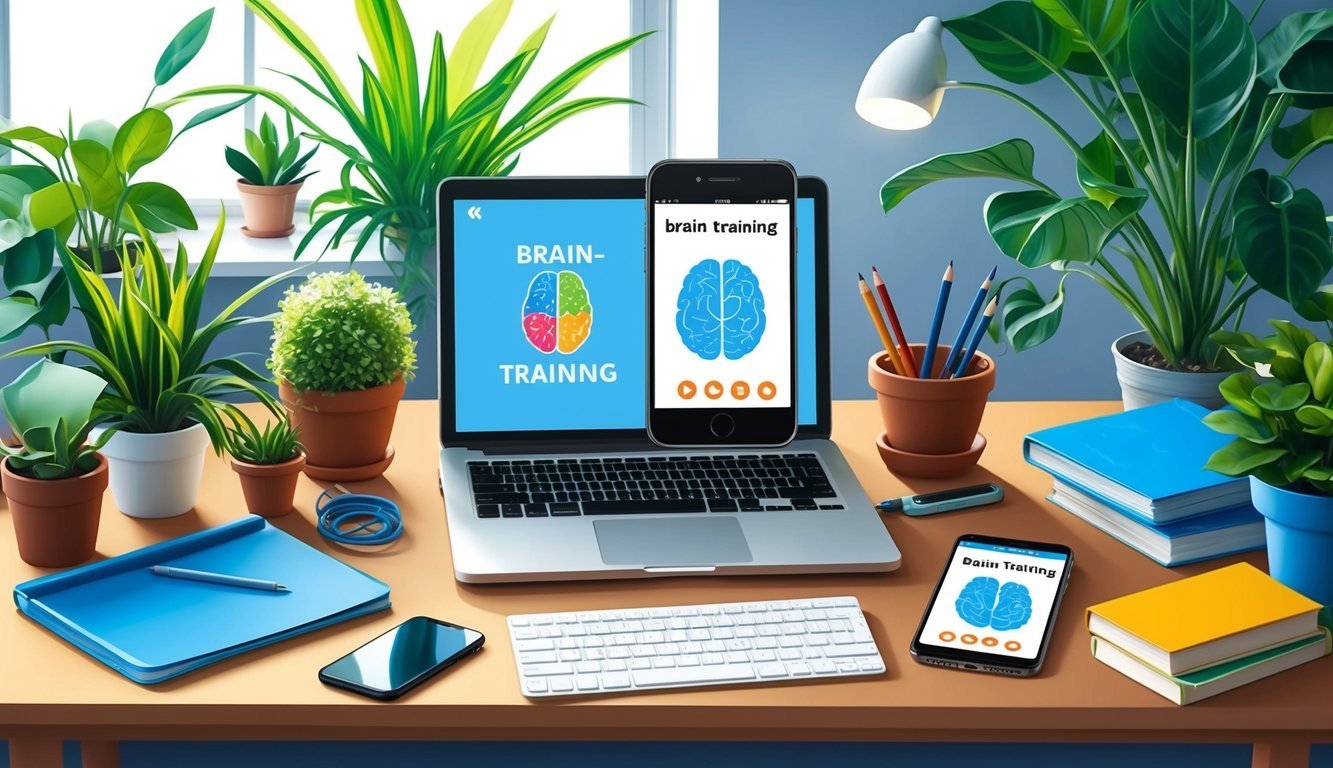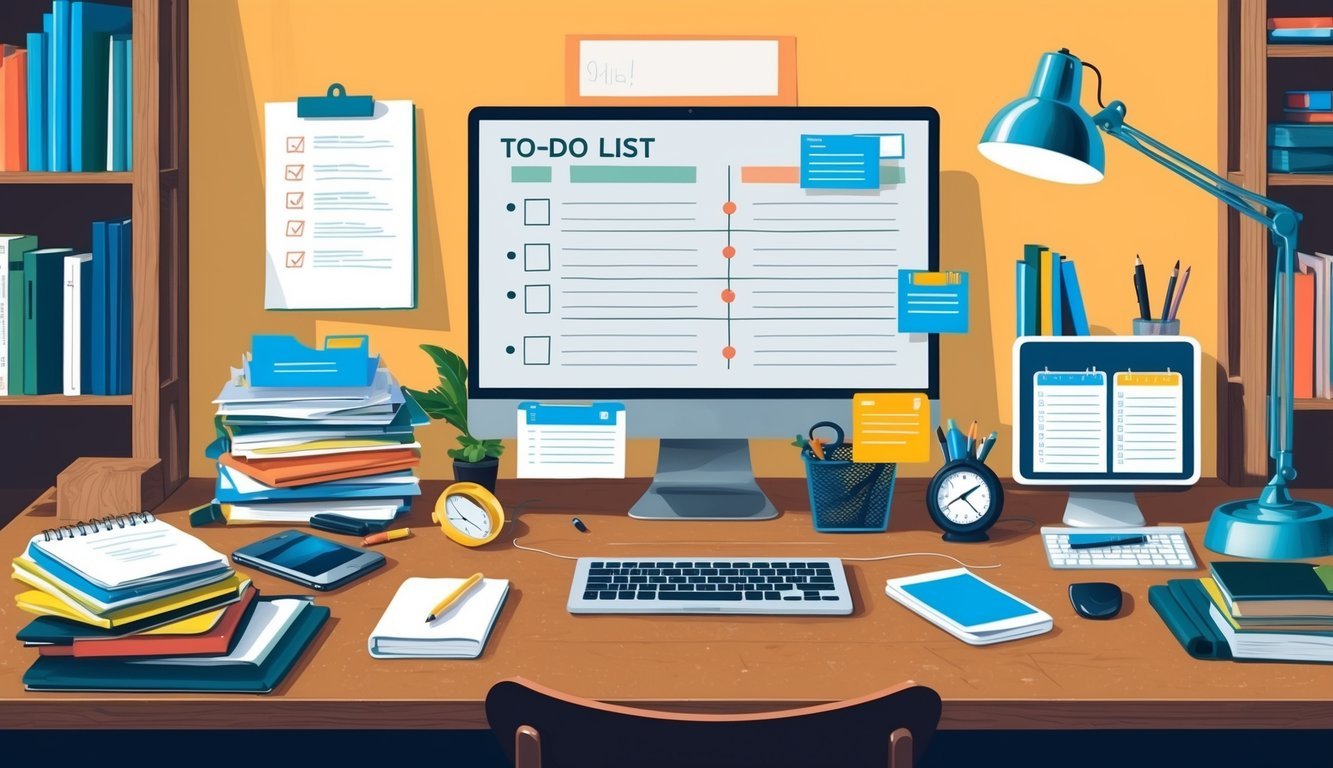I often find myself juggling multiple tasks, and I easily feel overwhelmed.
Maintaining mental clarity and focus can be quite a challenge in our fast-paced world. Implementing effective strategies can significantly enhance my productivity and help me navigate daily responsibilities more smoothly.

By exploring various techniques, I can discover practical ways to sharpen my concentration and clear my mind.
Finding the right strategies not only boosts my mental efficiency but also contributes to my overall well-being.
It’s all about creating an environment and mindset that fosters better focus and clarity.
1) Practice Mindfulness Meditation
I find mindfulness meditation to be a game changer for clarity and focus.
It helps me tune into the present moment, pulling me away from distractions.
Just taking a few minutes to breathe and focus makes a huge difference.
One effective method is Mindfulness-Based Stress Reduction (MBSR).
This involves weekly classes and daily exercises.
It’s about training myself to be present, often through yoga and meditation.
When I meditate, I sit comfortably, close my eyes, and take deep breaths.
I focus on my breath—inhale for five seconds, then exhale for five seconds.
This simple practice helps clear my mind and enhances my concentration.
Adding mindfulness to my daily routine has improved my productivity.
Even short sessions can help me manage stress and mental clutter.
Just a few minutes can recharge my mind and keep me centered throughout the day.
Get Regular Exercise
I’ve found that regular exercise can be a game-changer for mental clarity.
When I make it a point to move my body, I notice an improvement in my focus and overall mood.
Exercise increases blood flow to the brain, which helps with cognitive function.
It also boosts the production of endorphins, those feel-good chemicals that enhance my overall well-being.
Even a short walk can do wonders.
I usually take a brisk stroll outside, which clears my mind and gives me a fresh perspective.
I also enjoy incorporating different activities, like yoga or dancing, into my routine.
These not only keep things fun but also help relieve stress, making it easier for me to concentrate on tasks.
Finding what works for me has been key.
Whether it’s a gym session or a casual bike ride, staying active has sharpened my thinking and kept me productive throughout the day.
3) Maintain a Balanced Diet
I’ve noticed a big difference in my focus when I eat a balanced diet.
The right nutrients can really boost my brainpower and help me stay productive throughout the day.
Including foods rich in omega-3 fatty acids, like salmon or walnuts, has helped sharpen my memory.
I also make sure to eat plenty of fruits and vegetables for antioxidants that protect my brain cells.
B vitamins are essential too.
Foods like leafy greens, eggs, and whole grains can enhance my energy levels and focus.
Iron, found in beans and lentils, is another game-changer for maintaining good cognitive function.
I keep an eye on my caffeine intake as well.
A moderate amount can improve alertness, but too much can lead to jitters and anxiety.
I prefer starting my day with a cup of coffee or tea for that nice mental boost.
Hydration is key for clarity, so I try to drink enough water.
Staying hydrated keeps my mind sharp, which is crucial when I need to stay on task.
Eating regular meals instead of skipping them also helps maintain my energy levels throughout the day.
4) Prioritize Sleep

Sleep is essential for staying sharp and focused.
When I make sleep a priority, I often notice improvements in my mental clarity.
Just like brushing my teeth daily helps maintain dental health, consistent sleep habits enhance my cognitive function.
Creating a sleep-friendly environment is key.
I keep my bedroom cool, dark, and quiet.
Avoiding screentime for at least an hour before bed helps me wind down and prepare for sleep.
Establishing a regular sleep schedule makes a big difference too.
Going to bed and waking up at the same time each day helps regulate my body clock.
If I find myself restless, I get out of bed and engage in a calming activity until I feel sleepy.
I also find that short naps can be beneficial during the day.
If I didn’t get enough sleep at night, a quick 20-minute nap can recharge my brain.
It’s all about finding what works for me to keep my mind clear and focused.
Prioritizing sleep has a direct impact on my productivity.
5) Use the Pomodoro Technique

I’ve found the Pomodoro Technique to be a game changer for my focus.
It’s simple: I set a timer for 25 minutes and dive into one task.
This focused work interval is called a “Pomodoro.”
Once the timer goes off, I take a five-minute break.
This short pause helps me recharge.
After completing four Pomodoros, I reward myself with a longer break of 15 to 30 minutes.
Using this method helps me avoid multitasking.
When I concentrate on one task at a time, I notice my work quality improves.
Plus, those short breaks allow my mind to refresh, which is key for maintaining mental clarity.
Overall, the rhythm of working and breaking keeps me focused.
I feel more productive and less mentally drained after a session.
It’s a straightforward technique that really works for me.
6) Try Brain-Training Apps

I find that brain-training apps can be a fun way to enhance focus and mental clarity.
These tools often offer engaging games and challenges designed to sharpen various cognitive skills.
Many of these apps adapt to individual skill levels, ensuring a personalized experience that keeps users engaged.
In addition to benefiting younger individuals, they can also play a significant role in supporting cognitive function in seniors, helping to maintain memory and problem-solving abilities.
Regular use of brain-training tools may contribute to long-term mental agility and overall brain health.
One app that stands out is Lumosity.
It features a variety of mini-games aimed at improving memory, attention, and problem-solving skills.
I enjoy how it tracks my progress over time, making it easier to see improvements.
Peak is another app I’ve tried.
It provides short, intense workouts that really get my brain moving.
Plus, the competitive aspect keeps me motivated.
I can even compare my scores with friends.
If I’m looking for a more detailed analysis, RescueTime helps me identify which activities occupy most of my time.
By recognizing my patterns, I can minimize distractions and focus better.
These apps not only entertain but also contribute to my mental agility.
Regular use can make a noticeable difference in how I approach tasks throughout the day.
7) Take Regular Breaks

I’ve noticed that taking regular breaks can make a significant difference in my focus.
When I push through without stopping, my mind tends to wander, and I lose track of my tasks.
Breaks help reset my brain.
Research supports this idea.
Studies show that short pauses during the workday can boost my productivity and creativity.
It’s like giving my mind a little recharge.
During my breaks, I find it helpful to step away from my screen.
A quick walk or even just some stretches can clear my head.
I also try to engage in low-stress activities during my breaks.
This kind of relaxation can reduce tension and improve my overall mental wellness.
With less stress, I feel more resilient when challenges arise.
Incorporating these breaks into my routine has made me more efficient.
I often return to my tasks with renewed energy, which leads to better decision-making and task management.
8) Set Clear Goals

When I sit down to work, I like to start by defining what I want to achieve.
Setting clear goals gives my tasks direction and purpose.
I break my larger goals into smaller, manageable ones.
This way, I can focus on one step at a time without feeling overwhelmed.
I find it helpful to write my goals down.
Whether it’s a to-do list or a vision board, having a visual reminder keeps me motivated.
I also make sure my goals are specific and time-bound.
For example, instead of saying “I’ll work on my project,” I say, “I’ll finish the outline by 3 PM.”
Checking off tasks as I complete them feels rewarding.
It reinforces my progress and helps maintain my momentum.
Lastly, I review my goals regularly.
This helps me stay aligned with my priorities and adjust if necessary.
9) Use a Planner or Journal

I find that using a planner or journal really helps me improve my mental clarity.
Writing down my thoughts, tasks, and goals gives me a clear picture of what I need to focus on.
Setting daily intentions at the start of my planner page positively shapes my day.
It gives me a sense of purpose and motivation to tackle whatever comes my way.
I also enjoy evening journaling.
Reflecting on my day allows me to celebrate my achievements and learn from my challenges.
This practice helps me let go of any stress before I go to bed.
Incorporating both planning and journaling into my daily routine reduces anxiety.
It creates a structured space for my thoughts and plans.
I feel more organized and ready to take on my tasks.
What Is Mental Clarity?
Mental clarity refers to a state where thoughts are organized and feelings are clear.
It helps prioritize tasks and understand goals.
When experiencing mental clarity, distractions fade, enhancing the ability to concentrate.
Factors affecting mental clarity include:
- Sleep: Quality rest rejuvenates the mind for better cognitive function.
- Stress: High stress levels can cloud thinking.
- Nutrition: A balanced diet fuels the brain, improving focus.
Recognizing the signs of mental fog—like lack of focus or racing thoughts—can help take steps to regain clarity.
The Science Behind Focus
Focus is not just about willpower; it’s a neurological process.
The brain has natural mechanisms that regulate attention, but various factors can impact them.
For example, studies reveal that taking breaks can enhance cognitive efficiency.
Some essential elements include:
- Neurotransmitters: Chemicals like dopamine influence motivation and focus.
- Environmental Factors: A clutter-free workspace reduces distractions, allowing better focus.
- Mindfulness Practices: Techniques like meditation can rewire the brain for improved concentration.
Understanding these elements equips with tools to maintain mental clarity and enhance productivity throughout the day.
Enhancing Productivity Through Focus
Focusing on the task at hand is crucial for maximizing productivity.
By improving the ability to concentrate, more can be achieved in less time.
Let’s explore the benefits of enhanced focus and how to create an environment that fosters concentration.
Benefits Of Improved Focus
Improved focus can lead to significant gains in productivity.
When concentrating better, tasks can be completed more efficiently, making fewer mistakes along the way.
This not only saves time but also reduces stress since there’s no need to fix errors constantly.
Some key benefits include:
- Increased Efficiency: Tasks that may take hours can be accomplished in less time.
- Enhanced Decision-Making: Focus allows for clearer thinking, which leads to smarter choices.
- Greater Satisfaction: Completing a project without distractions provides a sense of accomplishment.
I notice that when I’m fully focused, I perform better and feel more motivated to tackle additional tasks.
Setting Up A Productive Environment
Creating a productive environment is critical for maintaining focus.
A clutter-free space helps minimize distractions.
Here are a few steps I take to optimize my workspace:
- Declutter: I remove unnecessary items from my desk.
- Organize Supplies: Keeping essential tools within reach streamlines workflow.
- Control Noise: I use noise-canceling headphones or play soft background music to block out distractions.
Natural light and comfortable seating can also enhance my focus.
I make sure to adjust my workspace for comfort to promote sustained attention.
By tailoring my environment to suit my needs, I create an atmosphere conducive to high productivity.

